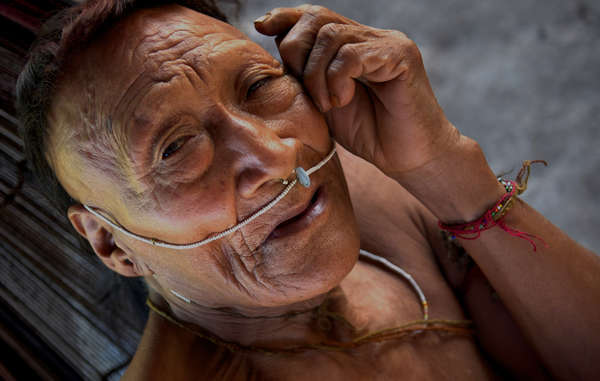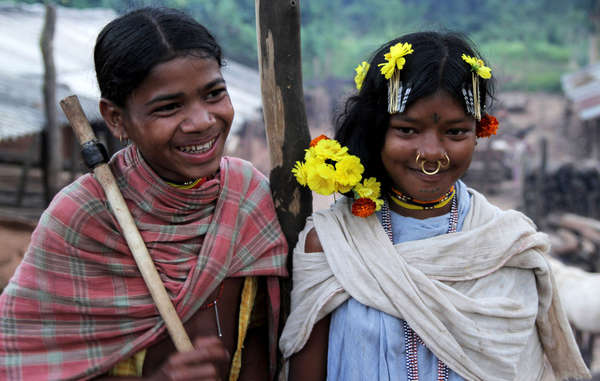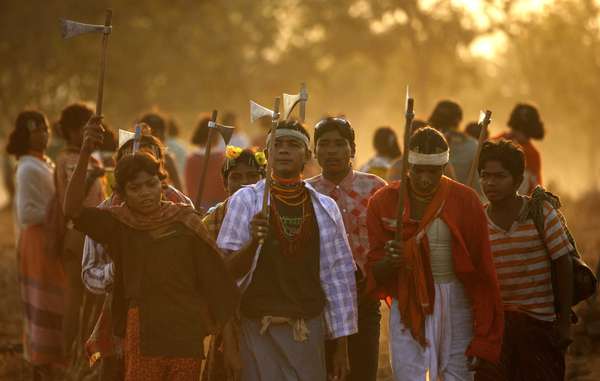
Protesters will carry placards symbolizing the lethal effects of the Camisea project on Peru's uncontacted tribes.
© Survival
Survival International supporters will protest outside Peruvian embassies and consulates around the world on April 23rd to call for an end to the deadly expansion of the Camisea gas project in Peru’s Amazon rainforest, which puts the lives of uncontacted Indians at risk.
Protesters will carry placards and gas masks symbolizing the lethal effects of the Camisea project on uncontacted tribes in the area, and will hand a petition to Peruvian embassies and consulates in London, San Francisco, Berlin, Madrid and Paris.
The urgent petition asks Peru’s President to stop outsiders and companies from invading uncontacted tribes’ land, and has been signed by over 120,000 people around the world.
Uncontacted Indians are extremely vulnerable to diseases brought in by outsiders – initial exploration in the Camisea block in the 1980s led to the deaths of half the Nahua tribe.

Half of the Nahua tribe was wiped out after their land was opened up for oil exploration in the 1980s.
© Johan Wildhagen
Camisea lies in the heart of the Nahua-Nanti Reserve for several uncontacted and isolated tribes, and is the buffer zone to the Manu National Park, considered by UNESCO to be ‘the most biodiverse place on earth’. It is Peru’s largest gas project, and is run by Argentina’s Pluspetrol, US’s Hunt Oil and Spain’s Repsol.
Now Peru’s Ministry of Energy is set to approve a massive expansion of the project, despite a UN call for the ‘immediate suspension’ of the work, that is likely to prove devastating for the tribes.
Apart from the risks of diseases from first contact, the gas work also threatens to destroy the forest and scare away the game on which the uncontacted Indians depend for survival.
Survival’s Director Stephen Corry said today, ‘Expanding the Camisea project deep into the territory of uncontacted Indians is a reckless and incredibly irresponsible thing to do. The UN has called for the plan to be scrapped – I hope Peru’s government has the sense to listen.’
Note to editors:
The protests will be held on Tuesday, April 23, outside the Peruvian embassy in London (52 Sloane Street, London SW1 9SP) at 9.30am (GMT+1); and outside the Peruvian Consulate in San Francisco (870 Market Street, Suite 1067, San Francisco, California 94102) at 9am (PST).
Read this online: http://www.survivalinternational.org/news/9157
Ban upheld: Avatar tribe ‘to decide’ future of Vedanta mine

India's Supreme Court has recognized the Dongria Kondh's right to worship their sacred mountain in a landmark decision.
© Survival
In a landmark ruling, the Indian Supreme Court today rejected an appeal to allow Vedanta Resources to mine the Niyamgiri hills. In a complex judgement, the court decreed that those most affected by the proposed mine should have a decisive say in whether it goes ahead.
The court recognized that the Dongria Kondh’s right to worship their sacred mountain must be ‘protected and preserved’, and that those with religious and cultural rights must be heard in the decision-making process. The tribe now has three months to decide whether to allow mining of their sacred hills, but there are serious concerns over the pressures that might be heaped on the community during this crucial time.
The Dongria’s determined fight against the FTSE 100 mining company has been likened to the story of ‘Avatar’ and has won them the support of celebrities. British actress Joanna Lumley said today, ‘It is wonderful to see justice finally prevail. For the court to allow the mine would have been unthinkable – the evidence against the mine was so strong.’
The decision deals a blow both to billionaire Anil Agarwal’s Vedanta and to the state-owned Odisha Mining Corporation, which brought the appeal and supported Vedanta’s mine from the beginning.

The Dongria reasserted their pledge not to leave the Niyamgiri hills at their annual festival in February.
© Bikash Khemka / Survival
Final clearance for the mine was blocked by India’s Environment Minister in 2010. Until recently, however, Vedanta had kept its refinery at the bottom of the hill in operation. The refinery was closed in December 2012 due to a lack of bauxite to supply the facility.
Opposition to the mine has been vocal across the Indian state of Odisha. Thousands of protesters joined a ‘rally of defiance’ last December and hundreds of Dongria reasserted their pledge not to leave the Niyamgiri hills at their annual festival in February. The project has also come under attack from the Norwegian and British governments, the Church of England, and many others, resulting in several shareholders disinvesting from Vedanta.
At a time when the central government has been reported to want to water down tribal rights, this judgement will be seen as upholding the rights of the Dongria and all of India’s tribal peoples.
Survival’s Director Stephen Corry said, ‘This is a huge relief, and shows that companies like Vedanta are not all-powerful: local and global campaigning really does work. Companies and governments worldwide should sit up and take notice – Vedanta has learned the hard way that the days of stealing tribal land with impunity are over. The Dongria have consistently and passionately said no to Vedanta’s mine. Let us hope that they have the final say. It is essential that they are protected from harassment and intimidation at this critical time and that, when it is made, their decision is respected by Vedanta and the government.’
Read this online: http://www.survivalinternational.org/news/9155

